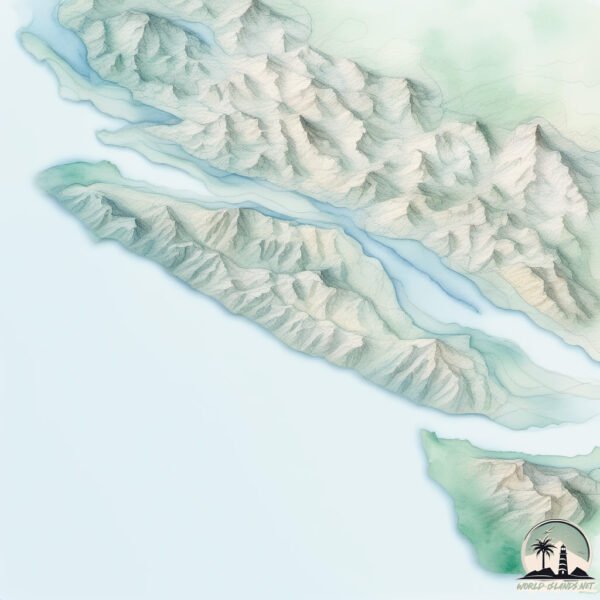Vancouver

Welcome to Vancouver, a Temperate island in the North Pacific Ocean, part of the majestic Pacific Ocean. This guide offers a comprehensive overview of what makes Vancouver unique – from its geography and climate to its population, infrastructure, and beyond. Dive into the details:
- Geography and Size: Explore the island’s size and location.
- Climate and Weather: Weather patterns and temperature.
- Topography and Nature: Uncover the natural wonders of the island.
- Infrastructure and Travelling: Insights on reaching, staying, and making the most of your visit.
- News and Headlines: Latest News.
Geography and size of Vancouver
Size: 31815 km²
Coastline: 4425 km
Ocean: Pacific Ocean
Sea: North Pacific Ocean
Continent: North America
Vancouver is a Giant Island spanning 31815 km² with a coastline of 4425 km.
Archipel: Inside Passage Islands – A series of islands along the Pacific Northwest coast of North America, known for their stunning coastal landscapes and rich wildlife.
Tectonic Plate: North America – Covers North America and parts of the Atlantic and Arctic Oceans, characterized by diverse geological features and varying levels of seismic activity.
The geographic heart of the island is pinpointed at these coordinates:
Latitude: 49.64415687 / Longitude: -125.72919849
Climate and weather of Vancouver
Climate Zone: Temperate
Climate Details: Temperate Oceanic Climate
Temperature: Warm Summer
Climate Characteristics: Known for its moderate year-round temperatures with ample rainfall and no dry season. Warm summers are characteristic.
Topography and nature of Vancouver
Timezone: UTC-08:00
Timezone places: America/Los_Angeles
Max. Elevation: 2195 m Golden Hinde
Mean Elevation: 496 m
Vegetation: Evergreen Needleleaf Forest
Tree Coverage: 74%
The mean elevation is 496 m. Dominating the island’s landscape, the majestic “Golden Hinde” rises as the highest peak, soaring to impressive heights. The island is characterized by Mountains: High, steeply elevated landforms. Characterized by both a high maximum elevation (over 500 meters) and a high mean elevation, creating rugged, mountainous terrains on islands.
Dominating Vegetation: Evergreen Needleleaf Forest
Dominated by evergreen coniferous trees such as pines and firs, which retain their needle-like leaves throughout the year. These forests are often found in cooler climates. Vancouver has a tree cover of 74 %.
Vegetation: 15 vegetation zones – Exceptionally Diverse Island
Islands with more than ten vegetation zones are among the most ecologically rich and varied in the world. These islands are akin to miniature continents, boasting an incredible array of ecosystems. The sheer range of habitats, from high peaks to deep valleys, rainforests to deserts, creates a mosaic of life that is unparalleled. They are crucial for conservation and ecological studies.
Infrastructure and Travelling to Vancouver
Does the island have a public airport? yes.
Vancouver has a public and scheduled airport. The following airports are located on this island: Bamfield Airstrip, Alberni Valley Regional Airport, Campbell River (E & B Heli) Heliport, Tofino / Long Beach Airport, Campbell River Airport, Nanaimo Airport, Comox Valley Airport / CFB Comox, Victoria International Airport, Port Hardy Airport.
Does the island have a major port? yes.
Vancouver is home to a major port. The following ports are situated on the island: BAMBERTON, VICTORIA HARBOR, TAHSIS, PORT ALICE, COAL HARBOR, PORT MCNEILL, DUNCAN BAY, NANOOSE HARBOR, NANAIMO, HARMAC, GOLD RIVER.
The mean population of Vancouver is 25 per km². Vancouver is Gently Populated. The island belongs to Canada.
The name of the island resonates across different cultures and languages. Here is how it is known around the world: Arabic: جزيرة فانكوفر; German: Vancouver Island; Spanish: Isla de Vancouver; French: île de Vancouver; Portuguese: Ilha Vancouver; Russian: Ванкувер; Chinese: 溫哥華島
Continuing your journey, Gabriola is the next notable island, situated merely km away.
Vancouver Island is paradise 😍 #vancouverisland #explorebc #britishcolumbia #hikingadventures



Canada is classified as Developed region: G7: Group of Seven – Major advanced economies, including Canada, France, Germany, Italy, Japan, the United Kingdom, and the United States. The level of income is High income: OECD.
News – Latest Updates and Headlines from Vancouver
Stay informed with the most recent news and important headlines from Vancouver. Here’s a roundup of the latest developments.
Social Media Posts about Vancouver
Please note: The data used here has been primarily extracted from satellite readings. Deviations from exact values may occur, particularly regarding the height of elevations and population density. Land area and coastline measurements refer to average values at mean high tide.
